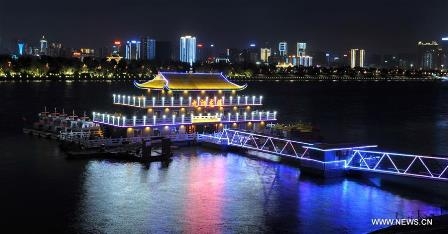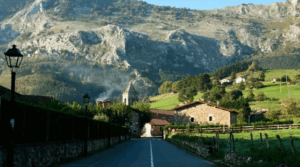Spring Festival – Lunar New Year in China

The Chinese celebrate the Lunar New Year, or Spring Festival this year on February 8. Most people will follow traditional cultural elements and customs in China’s most festive season.
Spring Festival this year marks the beginning of the Year of the Monkey, according to the Chinese zodiac that assigns one of 12 animals, either real or mythological, to each year.The monkey ranks the ninth in the cycle, preceded by the sheep and followed by the rooster.
A Chinese legend says the monkey was recommended by the tiger to be elected into the 12-animal zodiac. The tiger, ranking the third place in the zodiac, once fell into a hunter’s trap and was saved by the monkey.
Chinese traditionally love the monkey because it is cute, smart and resembles humans in many ways.In Chinese fairy tales, monkeys roamed the world before the sky was separated from the earth and long before mankind existed.
The primitive inhabitants in Tibet were believed to worship the rhesus monkey as their earliest ancestor, according to scholars on Tibetan studies.
When people encounter the year of their zodiac sign, it is recommended they wear red to ward off bad luck, with the most common being red string wristlets, red underpants and red socks.
When Chinese say something will happen only in “the year of the monkey, the month of the horse,” they mean the time is unforeseeable. But according to the zodiac system, such a zodiac alignment is quite predictable this year, coming from June 5 to July 3.
In many parts of China, young couples prefer having their babies born in the Year of the Monkey, hoping the children will grow up to be smart and lively. Baby booms are predicted this year in particular, as many urban couples are planning to have a second child under the country’s new family planning policy.
FIREWORKS AND LANTERNS
Most people stay up late on the eve of the lunar new year, watching the annual TV gala and eating snacks with their families. Those who choose to go to bed early are often woken up at midnight by fireworks, which continue for a week afterwards.
The fireworks and the red decorations in front of many homes and businesses were originally intended to scare away the “nian” (year in Chinese), a mythical beast supposed to have preyed on people and livestock at the turn of the year. The monster, however, was afraid of loud bangs and red color.
Although few now believe in the existence of the monster, Chinese families carry on the tradition of hanging red lanterns, setting off fireworks and fixing red scrolls with rhyming phrases on their doors, hoping all the items can ward off evil spirits and bring in good luck.
NEW YEAR EATS
Dishes served during Spring Festival often carry symbolic meaning. In northern China, dumplings are an indispensable dish for new year dinners. Many believe eating them will bring fortune, because the food resembles “yuan bao,” a boat-shaped gold ingot that was used as currency in centuries past.
Although most dumplings are filled with vegetables, meat or fish, some families put special items, most often coins, in one of their dumplings when they are preparing their meal. The person who finds the “special dumpling” is believed to have good luck for the whole year.
In southern China, where most people prefer rice to wheat, families eat glutinous rice cakes instead of dumplings for new year dinners. These cakes are also symbols of a prosperous new year.
Fish and leek are also common, as their names sound like “abundance” and “longevity,” respectively.
Nowadays, the large dinners prepared during the festival feature less symbolism and are seen more as occasions for family reunions, especially for those who live and work away from home and return once a year for the festival.
LUCKY MONEY
Children are especially fond of Spring Festival because they know it will bring them gifts in the form of red envelopes stuffed with “lucky” money, presented by parents, grandparents and other relatives. The custom is intended to convey greetings and protect children from bad luck during the new year. The amount given can range from 50 yuan (8 U.S. dollars) to several thousand yuan, but the money must be given in an amount that ends with an even number.
It can be given in exchange for a child’s new year greetings, or be stuck under the child’s pillow during the new year eve.
TABOOS
There is a long list of things that Chinese will avoid during Spring Festival, though specific items vary from one region to another.
Chinese households carry out a full clean before the new year eve, partially to usher in a “clean” new year, and also because doing it after the start of the new year is believed to clear away good luck.
Quarrels, crying and cursing are forbidden, as people fear that bad behavior on the new year eve will continue throughout the coming year.
Housewives must be extremely careful in the kitchen to avoid breaking bowls, plates or glasses throughout the first lunar month, as the damage might forecast economic losses for their families during the new year.
In case a person breaks something, he or she must immediately say “sui sui ping an,” meaning “let’s be safe during the new year,” as “sui” in Chinese translates into “year” as well as “being broken.”
Many superstitious northern Chinese also believe that if a person has a haircut during the first month of the lunar year, his maternal uncle will die.
As a result, some barbershops are open nearly 18 hours a day for the pre-holiday rush for haircuts, which lasts for at least two weeks before the new year eve.
While women like to spruce up for the holiday, even men with short hair like to get an extra trim before the new year, in case their hair grows too long in one month before their next haircut, which is often scheduled for the second day of the second lunar month.
The tradition can be traced back to an ancient story about a barber who could not afford a decent new year gift for his maternal uncle, choosing instead to give his uncle a haircut that made him look much younger.
After his uncle passed away, the barber missed him very much, crying with the coming of each new year. The Chinese phrase for “missing one’s maternal uncle” (“si jiu”) is very close in pronunciation to the phrase for “death of one’s maternal uncle.
Courtesy : Xinhua / Feb. 7, 2016















